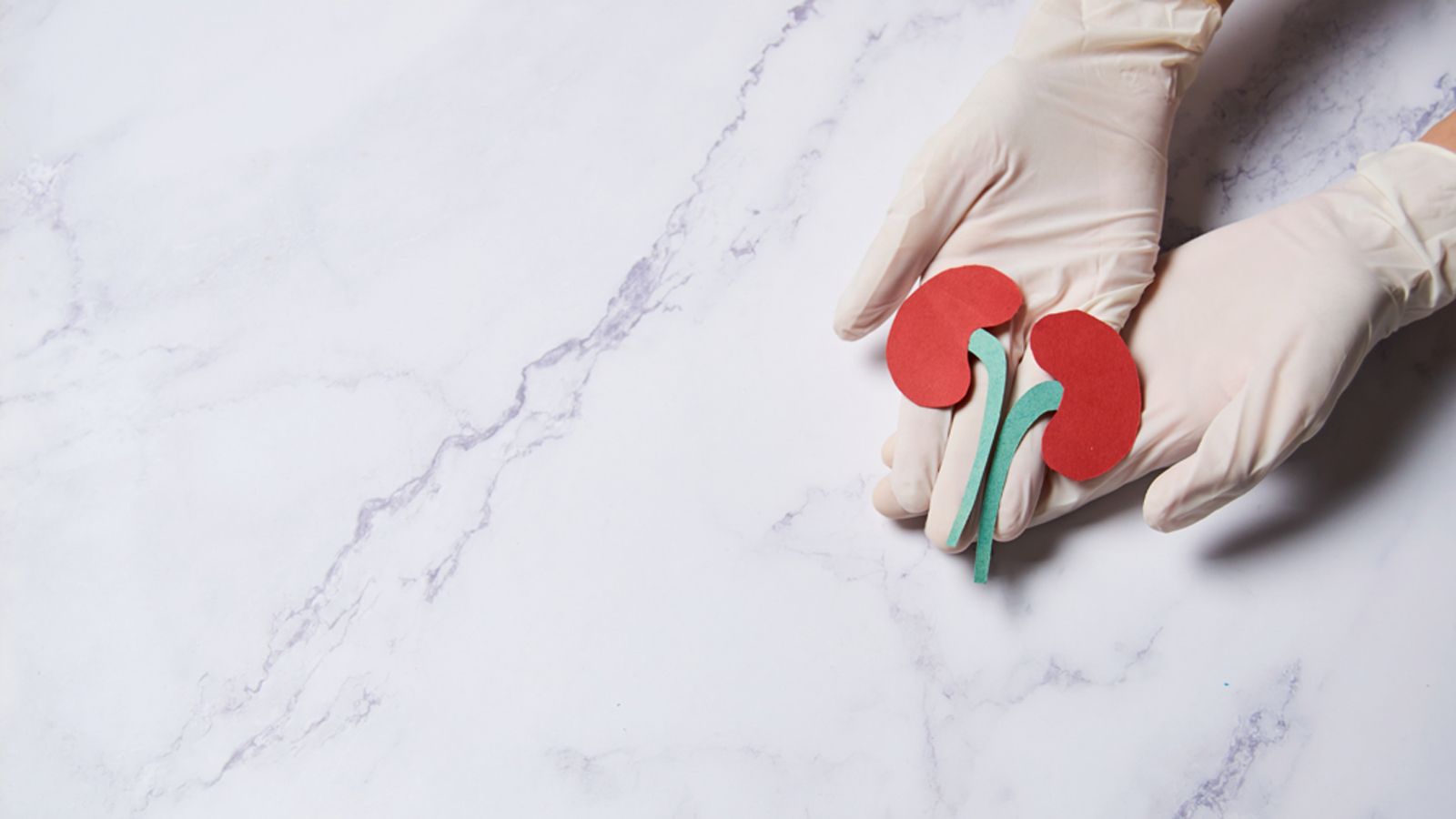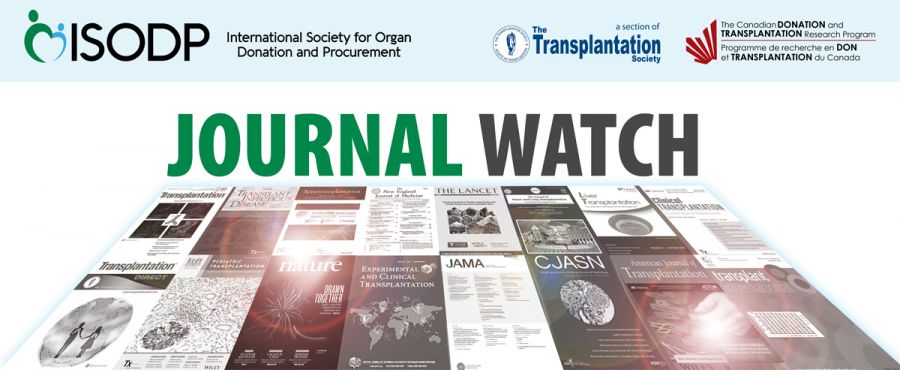Introduction
To all the Journal Watch Readers for 2022,As 2022 winds down, we have one last edition delivered straight from the North Pole. As always, we are pleased to report a diverse selection of articles with topics ranging from public outreach to specific communities to artificial intelligence predictions of time to death after terminal extubation. The topics selected will certainly inform practice and policy, but more importantly they open avenues of future investigation, highlighting areas that require a better understanding from donation stakeholders. Start looking for grants and don’t be afraid to seek out collaborators among these authors!
We have been honored to work on the Journal Watch this year and have exciting ideas for next year’s edition. At the upcoming meeting of the ISODP executive council the future of the Journal Watch will be discussed, including what group will be responsible for overseeing it in 2023. We the Canadian team are happy to offer our help with at least the co-leading and would also be thrilled to hear from other countries or groups that would like to help. We have a lot of exciting ideas about future projects to improve the Journal Watch itself and push the project in new directions.
This wouldn’t be possible without the continued hard work of the team with Amina Silva and Sylvia Okonofua carrying so much of the load of finding and summarizing articles and Stéphanie Larivière making everything look amazing. We cannot thank them enough.
As end of year holidays and celebrations start across the world, we hope you all find time to spend with the ones you love and take time to reflect on the important work you do to maintain the global donation and transplantation system.
Looking forward to sending out more editions next year,
Sonny Dhanani
(Associate Director, CDTRP and Chair of the Canadian Donation Physician Network)
sdhanani@cheo.on.ca
Matthew Weiss
(Medical Director - Organ Donation at Transplant Québec and National Lead of the LEADDR Research Program, CDTRP)
matthew.weiss.med@ssss.gouv.qc.ca

Impact of Donation Physicians on Deceased Organ Donation: A Systematic Review
Squires et al.
Canadian Journal of Kidney Health and Disease, 2022
Corresponding author: Janet E. Squires - jasquires@ohri.ca
Squires et al conducted a systematic review of the international literature to investigate the effectiveness of donation physicians in improving organ donation outcomes. The review included 12 quantitative studies reporting on organ donation outcomes from donation physicians’ involvement. These outcomes included potential organ donors (increase between 8%-143% in potential organ donors following implementation of donation physicians) and actual organ donors (increase between 15%-113% in actual organ donors). Other metrics increasing included donor consent rate, organ procurement and transplants. Though there are many factors improving system performance, findings from this review highlighted that donation physicians are key to improve deceased organ donation and further studies should focus on implementation and evaluation of such programs.

Care bundle for family interview for pediatric organ donation
da Silva Knihs et al.
Journal of Pediatric Nursing, 2022
Corresponding author: Neide da Silva Knihs - yneide.knihs@ufsc.br
Interviews related to organ donation with family members are challenging, and when the decision involves children and adolescents the topic can be even more sensitive, and therefore a care bundle can be an important resource to support health care professionals during the conduction of family interviews. Knihs and colleagues conducted a three-phase study with a literature review, qualitative interviews (healthcare professionals, n=17; family members, n=9), and an expert committee (n=5) review to develop a care bundle. The care bundle developed included three categories: communication of death, emotional support and information about organ and tissue donation. The authors offer comprehensive guidance on the care strategies for each of the categories to assist healthcare professionals to increase the quality of family interviews and impact the reduction of family refusals.

Culturally Tailored and Community-Based Social Media Intervention to Promote Organ Donation Awareness among Asian Americans: "Heart of Gold"
Siminoff et al.
Journal of Health Communication, 2022
Corresponding author: Karikarn Chansiri - karikarn.chansiri@temple.edu
Organ donation disparities among Asian Americans have persisted over years, and although this population has significant transplantation needs, they have the lowest organ donation rates in US. Therefore, Siminoff and colleagues developed a culturally and linguistically tailored video using a family appeal among Asian Americans to promote organ donation awareness. The video development involved a 12-member community effort, and the content was informed by a previous qualitative focus group study. The video was distributed on social media platforms and metrics were tracked for evaluation. Results highlighted that in six months the video reached 36,845 Asian Americans and the engagement was higher in Facebook and paid approaches. The findings from this study show that the use of social media can be an effective communication strategy to increase organ donation awareness among Asian Americans, particularly females over 45 years of age and help reducing the organ donation disparities among ethnic minorities.

Kidney utilization in the Netherlands - do we optimally use our donor organs?
Schutter et al.
Nephrology Dialysis Transplantation, 2022
Corresponding author: Rianne Schutter - r.schutter@umcg.nl
As donation programs increase referral rates, transplantation systems are forced to consider more donors whose organs are at increased risk of graft dysfunction or failure – advanced age, increased comorbidities, etc. – which puts pressure on systems to improve utilization rates. However, the best measures of organ utilization are unclear, an issue highlighted in this report from Schutter et al. from the Netherlands. Using Dutch and European databases from 2015-2020, this group reviewed the recorded reason for non-utilization of every potential kidney transplant in the Netherlands. In doing so, they showed that the traditionally reported non-utilization metric of discard rates – percentage of recovered but not transplanted kidneys – substantially underestimated the number of non-utilized referred donors. Many of the reported reasons for non-utilization were somewhat or wholly subjective such as undefined “poor organ quality”. The group called for increased standardization of reasons for non-utilization. Donation practitioners and systems should participate closely in these decisions and ensure that information is communicated in a way that encourages maximal, safe utilization of all potential donors.

Prediction of Death after Terminal Extubation, the Machine Learning Way
Huang et al.
Journal of the American College of Surgeons, November 2022
Terminal Extubation (TE), is the withdrawal of ventilatory support from terminally ill patients. Although TE and its natural progression to death provides closure to the suffering for patient and the family, the healthcare system lacks the tools to serve that purpose. This also negatively affects donation after cardiac death organ donation efforts. To this end, Huang et al aimed to develop an advanced machine learning model, long-short term memory (LSTM) to accurately predict death within 2 hours post-TE and compare to the standard clinical prediction score. Clinical, laboratory and demographic data from 1,965 patients were collected 24 hours before TE. Results indicate that the LSTM model outperformed the clinical prediction score (0.66 vs 0.51 p=0.001) to accurately predict death within 2 hours of TE. This information will facilitate end of life discussions, improve organ donation rates and help in operationalizing allocation of Intensive Care Units (ICU) resources efficiently.
Contact
Address
The Transplantation Society
International Headquarters
740 Notre-Dame Ouest
Suite 1245
Montréal, QC, H3C 3X6
Canada

